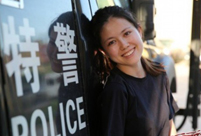 Amphibious armored vehicle unit conducts open sea drill
Amphibious armored vehicle unit conducts open sea drill
 Water relay in Henan
Water relay in Henan
 Ethnic culture feasts eyes of travelers
Ethnic culture feasts eyes of travelers
 80 security dogs assembled in Nanjing police dog training base
80 security dogs assembled in Nanjing police dog training base
 Graffiti artists paint on street walls in Xinjiang
Graffiti artists paint on street walls in Xinjiang
 Story of ceramic artist Zhang Lingyun
Story of ceramic artist Zhang Lingyun
 Magic summer night dream in Hongyuan
Magic summer night dream in Hongyuan
 Incredible creatures in headwaters drainage region of Lancang River
Incredible creatures in headwaters drainage region of Lancang River
 The future of rock n' roll seen in young rockers in China
The future of rock n' roll seen in young rockers in China
 Magnificent Yanziya Cliff
Magnificent Yanziya Cliff
GUANGZHOU, Aug. 17 -- Song Hong, an experienced drone operator in Beijing, is anxiously waiting for his license.
Song and 45 others, having passed theoretical exams and flight tests, are ready to become China's first batch of certificated flyers of unmanned aerial vehicles (UAVs) - drones.
The civil UAV industry is ready to take off in China. There is a huge demand. China's general aviation sector could hardly be less developed and is unable to meet the needs of all kinds of customers, from disaster relief to crop dusting.
Song is the boss of China Eagle, a UAV developer and manufacturer in Beijing. The firm works with the State Oceanic Administration on shore patrols.
"A ship patrol can cost up to 1 million yuan (163,000 U.S. dollars) per day, while a drone patrol costs only 300 yuan," Song said.
Shortly after this month's earthquake in the southwestern province of Yunnan, aerial photos taken by drones provided valuable information for disaster relief.
The Aircraft Owners and Pilots Association (AOPA) estimates that there are some 10,000 professional UAV operators in China and the number is growing rapidly. The Civil Aviation Administration requires that anyone who wishes to operate a UAV heavier than 7 kg must obtain a license. If the UAV is heavier than 116 kg and operating in the integrated airspace, where manned aircraft also fly, the operator my must have both a pilot's license and UAV certification.
Zhang Feng, secretary-general of AOPA, knows it will take time for all drone operators to get licenses, but there will be no punishment for those flying without licenses during the transition period. "The regulation aims to put things in order, not ban people from flying," he said.
Meng Wei, general manager of Art-Tech UAV in Shenzhen, welcomes the new regulations. "We now know where the boundary is and what we can do. It's definitely good news," he said.
AOPA China estimate that there are around 300 enterprises involved in the industry, including both state-owned enterprises and private startups.
"The gap between these companies and their western counterparts is not that big,"said Zhang Feng. "China's drone industry is quite competitive, especially in areas such as avionics and flight control."
At the beginning of the year, Shenzhen published a 7-year development plan for aviation and aerospace, promising a UAV industrial base with a drone flight testing center. Research institutions, manufacturers and parts suppliers will be encouraged to set up shop there.
With the increasing popularity of small drones, unauthorized flying has become an issue.
Last December, air traffic controllers at Beijing Capital International Airport were alerted to a low-flying UAV. Two passenger planes were forced to change course and more than 10 flights were delayed. It turned out to be a company conducting an aerial survey near the airport . Four people were detained for endangering public security.
"Reckless flying is dangerous to other aircraft as well as people on the ground. The operator licensure is just a start," said Ke Yubao, AOPA China's acting secretary-general.
Almost all airspace over the Chinese mainland is strictly controlled and all flying for whatever purpose must get official clearance.
Ke, a senior flight instructor, admitted that it is sometimes difficult to get permission.
"Without question, everyone should obey the rules in the air, just like on the roads," said Ke. "But on the other hand, the authorities should streamline airspace management. We've been calling for the opening up of the low-altitude airspace for years."
 Beautiful policewoman in an anti-terrorism SWAT team
Beautiful policewoman in an anti-terrorism SWAT team Cute photos of little Taoist nuns and monks go viral online
Cute photos of little Taoist nuns and monks go viral online Amphibious armored vehicle unit conducts open sea drill
Amphibious armored vehicle unit conducts open sea drill A post-90s girl who takes grandma to work
A post-90s girl who takes grandma to work Beijing policewomen posters become a hit
Beijing policewomen posters become a hit Armored regiment trains on the sea
Armored regiment trains on the sea Children spend 'Father's Day' with dads at work
Children spend 'Father's Day' with dads at work 'Pan Da' appear in Shanghai World Financial Center
'Pan Da' appear in Shanghai World Financial Center Champions take selfies on podium
Champions take selfies on podium The vanishing folk skills
The vanishing folk skills Intoxicating beauty of Dali, Yunnan province
Intoxicating beauty of Dali, Yunnan province Memorable moments of Ludian earthquake
Memorable moments of Ludian earthquake Bring world together to help elephant
Bring world together to help elephant 'Building Dreams'
'Building Dreams'  Labrang Monastery
Labrang MonasteryDay|Week|Month